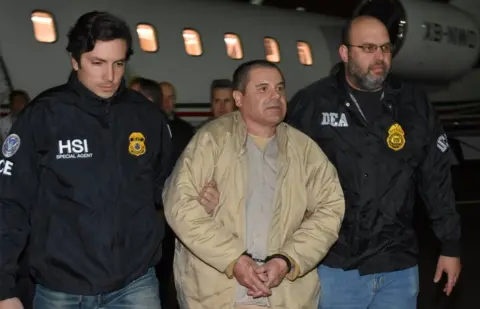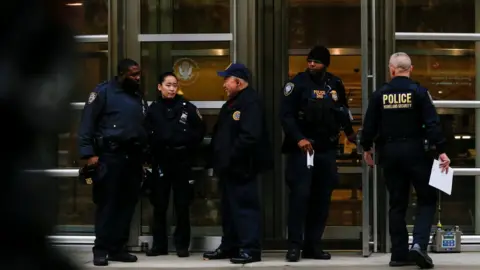'El Chapo' Guzmán: Dozen jurors picked for drug trial
 Reuters
ReutersAn autograph seeker and a Michael Jackson impersonator are among the jurors who were rejected to serve on the trial of notorious Mexican drug lord Joaquín "El Chapo" Guzmán.
Seven women and five men will decide if Guzmán is guilty of charges related to trafficking, laundering and firearms.
All 12 will remain anonymous under tight security terms and be escorted to and from court by US marshals.
The leader of the infamous Sinaloa Cartel could face life in prison.
Guzmán - whose nickname "El Chapo" means "Shorty" in English - has been convicted of drug trafficking in Mexico. But he twice escaped prisons before he was extradited to the US in 2017.
His trial in a federal court in New York begins on 13 November and could last up to four months.
Prosecutors say that under Guzmán the Sinaloa cartel shipped vast amounts of heroin, methamphetamines, cocaine and marijuana into the US.
Guzmán's lawyers have reportedly hinted they plan to argue he had a smaller role in the cartel than is believed.
 Reuters
ReutersOf the jurors, at least three are immigrants and three speak Spanish fluently. Several have relatives who work as prison guards or in law enforcement.
While nearly all said they had heard of Guzmán before being called for jury duty, they said they would be impartial in the trial.
Prosecutors said the stringent security conditions were necessary to protect jurors. They said Guzmán has a history of intimidating or ordering the murders of potential witnesses, a claim his defence denies.
One woman reportedly wept after learning she was picked, and said she was fearful of the attention she would get if her identity was discovered. She remains a part of the jury.
However, others were excused for more peculiar reasons.
One man, who was born in Medellín in Colombia, was not chosen after admitting he was a "bit of a fan" of Guzmán's, and had tried to get his autograph.
Another said his job as a Michael Jackson impersonator made him too well-known to serve, while a third man was reportedly rejected after saying he had heard of Guzmán thanks to a bagel named after the criminal at a deli near his home - a fact which, if made public, could lead to the man's identification.
